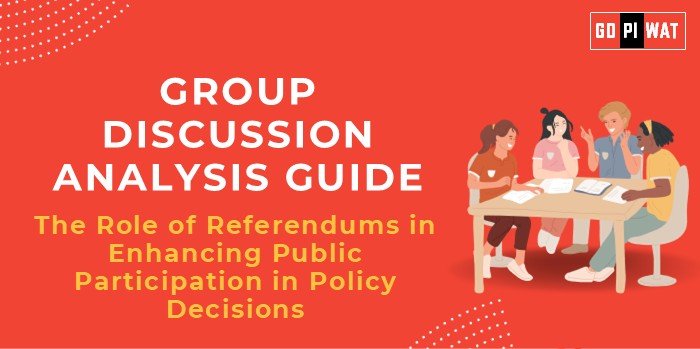📋 Group Discussion Analysis Guide: The Role of Referendums in Enhancing Public Participation in Policy Decisions
🌐 Introduction to the Role of Referendums
- Opening Context: Globally, referendums have emerged as a democratic tool to directly involve citizens in policy-making. They hold the potential to bridge the gap between governance and public will, empowering people to make collective decisions on critical issues.
- Topic Background: Historically, referendums have been pivotal in determining outcomes of significant political events, such as Brexit in the UK and constitutional reforms in several nations. However, their use sparks debates about their effectiveness, risks, and implications for democratic governance.
📊 Quick Facts and Key Statistics
- 🌍 Global Usage: 167 referendums held worldwide from 2000 to 2022—showcasing their importance in policy decisions.
- 📈 Participation Impact: Nations with frequent referendums report up to 20% higher voter engagement in regular elections.
- ✅ Success Metrics: Switzerland has held over 600 referendums, with a 70% success rate in reflecting public sentiment in policy changes.
- ⚠️ Challenges Noted: Research indicates a 45% polarization increase in countries post-referendum on divisive topics (e.g., Brexit).
👥 Stakeholders and Their Roles
- 🏛️ Governments: Initiate and regulate referendums to ensure transparency and legal compliance.
- 🗳️ Citizens: Active participants, voting to shape national policies.
- 📰 Media: Influences public opinion and facilitates informed decision-making.
- 🤝 NGOs & Academics: Provide neutral analysis, promote awareness, and encourage debate on referendum topics.
🏆 Achievements and Challenges
✨ Achievements:
- 📢 Enhanced Democratic Participation: Switzerland’s frequent referendums demonstrate high citizen engagement in governance.
- 📜 Policy Legitimacy: Public-backed decisions strengthen governmental credibility.
- 🤝 Conflict Resolution: Referendums often resolve contentious issues by providing a clear mandate, as seen in Colombia’s 2016 peace process.
⚠️ Challenges:
- 🎭 Manipulation Risks: Campaign biases can mislead public sentiment, as seen during Brexit campaigns.
- 💸 Cost Intensive: Conducting referendums is resource-heavy, limiting feasibility in developing countries.
- 🌍 Polarization: Divisive issues often deepen societal rifts, impacting social cohesion.
🌍 Global Comparisons:
- 🇨🇭 Success in Switzerland: Exemplary direct democracy model with minimal controversies.
- 🇬🇧 Challenges in the UK (Brexit): Demonstrated how misinformation can skew results and impact policy.
📚 Case Studies:
- 🇨🇭 Switzerland: Regular referendums on policy issues like healthcare reforms.
- 🇺🇸 California, USA: Citizens vote on state laws and budget allocations via ballot initiatives.
📋 Structured Arguments for Discussion
- 👍 Supporting Stance: “Referendums ensure policies resonate with public sentiment, fostering trust in governance.”
- 👎 Opposing Stance: “Complex policy issues require expert evaluation; referendums risk oversimplification of nuanced debates.”
- ⚖️ Balanced Perspective: “While referendums enhance participation, careful design and public education are crucial to mitigate risks of misinformation.”
💬 Effective Discussion Approaches
- Opening Approaches:
- 📜 Use a landmark referendum, e.g., Brexit, as a hook.
- 📈 Highlight increased participation in governance through statistics.
- Counter-Argument Handling:
- 📢 “While referendums empower citizens, their success hinges on informed participation. Public education campaigns can address this concern effectively.”
🔍 Strategic Analysis of Strengths and Weaknesses
- 💡 Strengths: Promotes transparency, resolves divisive issues democratically.
- ⚠️ Weaknesses: Costly, vulnerable to misinformation.
- 🌟 Opportunities: Technology-driven voting to improve inclusivity.
- ⚡ Threats: Risk of populism influencing decisions.
🎓 Connecting with B-School Applications
- 📖 Real-World Applications: Exploring referendums as a governance model in policy courses.
- 🤔 Sample Interview Questions:
- Should governments rely on referendums for major policy decisions?
- What lessons can be learned from the Brexit referendum?
- 📚 Insights for Students: Analyze the intersection of public opinion, leadership, and decision-making.
📄 Source: GD and WAT preparation frameworks, 2024.


